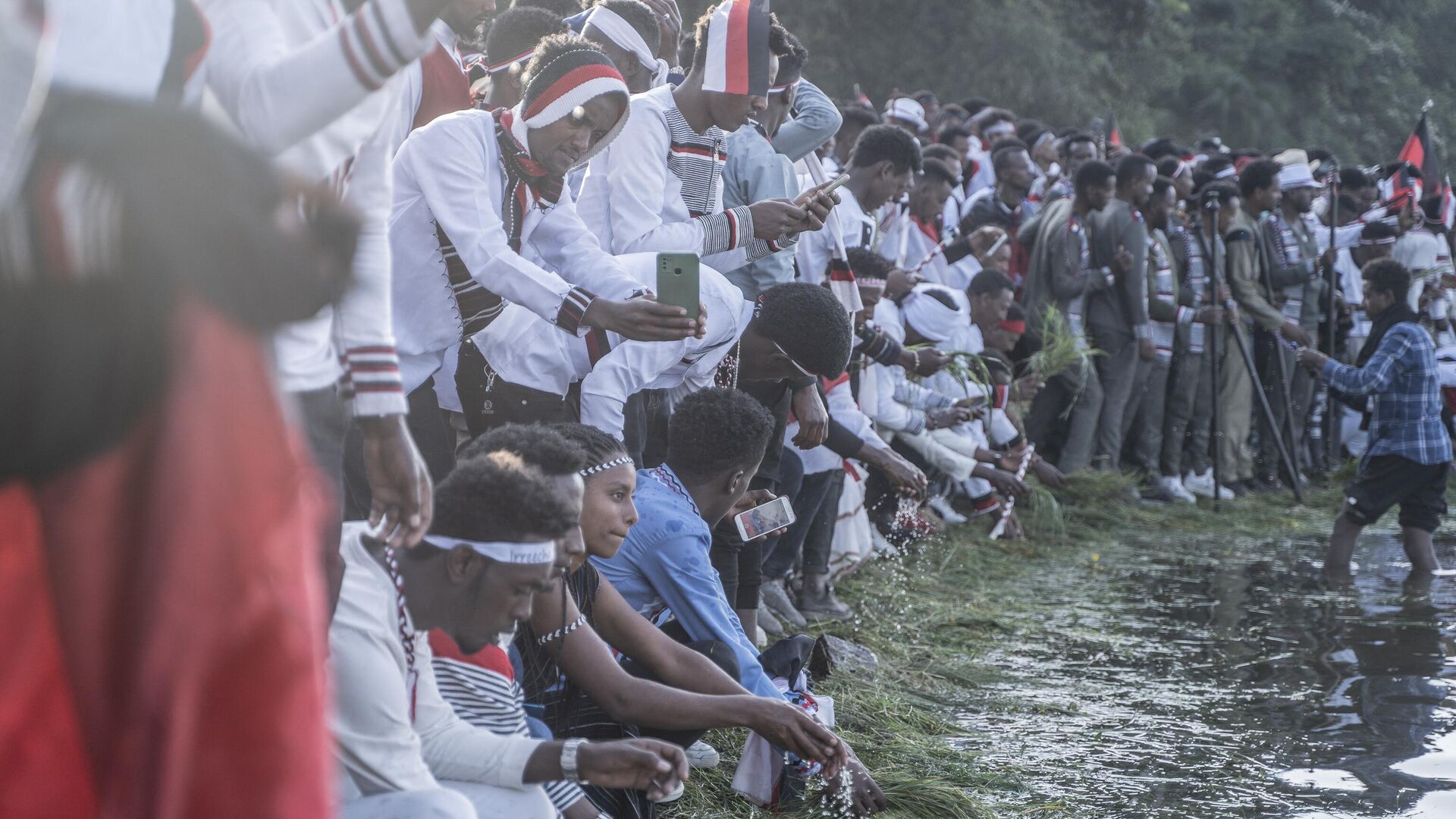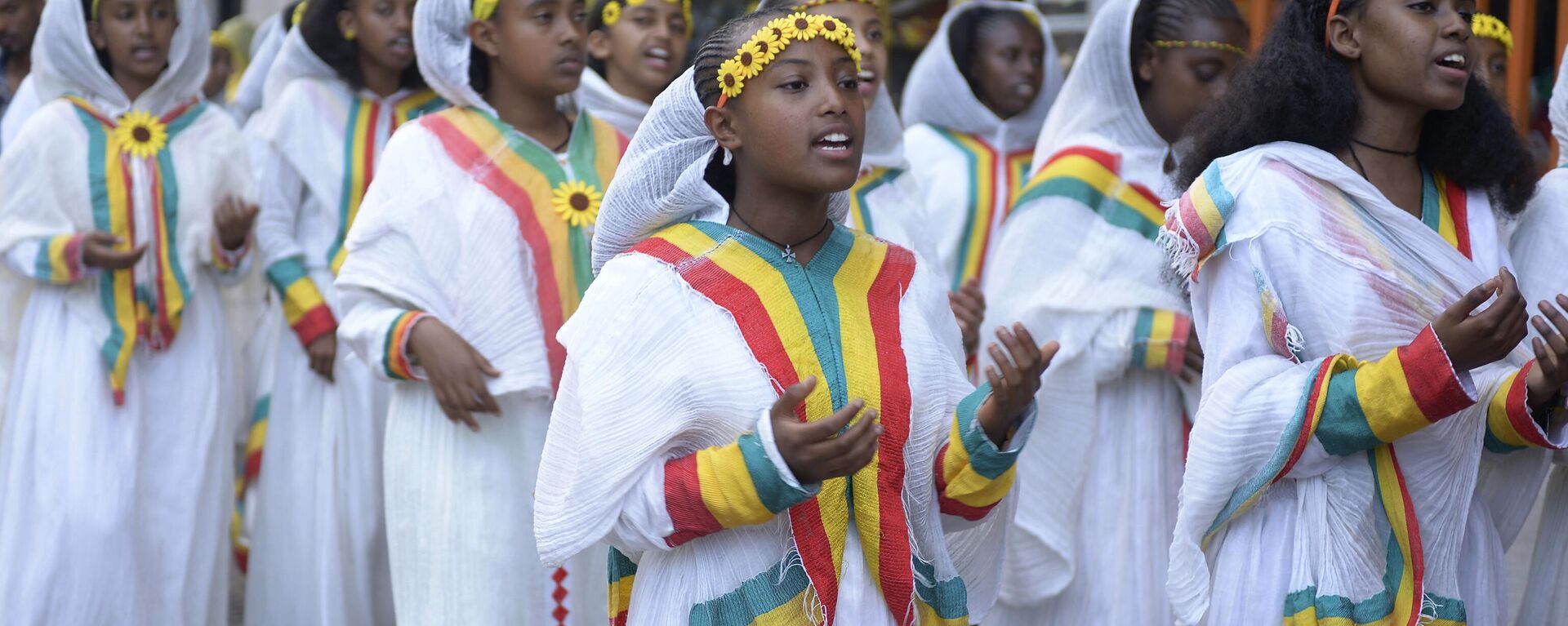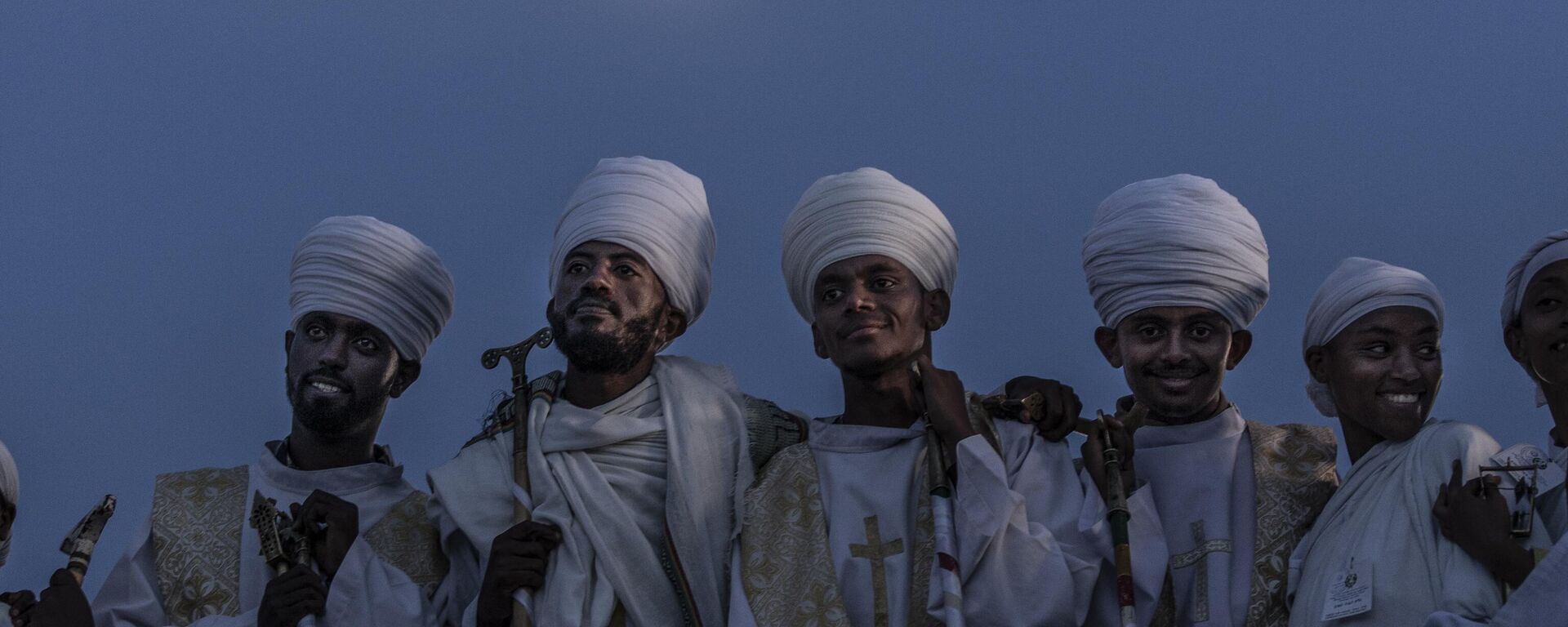https://en.sputniknews.africa/20231008/symbol-of-unity-and-fraternity-ethiopias-oromo-people-celebrate-irreecha-1062631267.html
'Symbol of Unity and Fraternity': Ethiopia's Oromo People Celebrate Irreecha
'Symbol of Unity and Fraternity': Ethiopia's Oromo People Celebrate Irreecha
Sputnik Africa
On October 7, one of Ethiopia's largest ethnic groups celebrated Irreecha, a thanksgiving festival marking the end of winter in the Oromia region. The festival... 08.10.2023, Sputnik Africa
2023-10-08T17:17+0200
2023-10-08T17:17+0200
2023-10-08T18:02+0200
features
east africa
ethiopia
horn of africa
holidays
oromia
abiy ahmed
celebration
https://cdn1.img.sputniknews.africa/img/07e7/0a/08/1062636551_0:160:3072:1888_1920x0_80_0_0_11cff2e6fbec8a63ba7e62a5c2229601.jpg
The annual Irreecha festival is observed this year under the theme of the holiday as "a symbol of unity and fraternity." The event exuded vibrancy and joy as people from different parts of the country gathered alongside their Oromo compatriots in the major cities of the region to partake in colorful festivities. On this occasion, Sputnik Africa takes a look at the main traditions of celebrating Irreecha in Ethiopia. How Oromo People Celebrate Their Thanksgiving FestivalOne of the unique Thanksgiving celebrations in the Oromo tradition is known as Irreecha, which translates to "green and fresh grass" and represents fertility and flourishing life through the blessings and guidance of the Creator, Waaqaa. This day typically occurs at the end of September or beginning of October, with numerous Oromos convening at a designated location near a river or mountain to commemorate this festive occasion.According to the traditional religion of the Oromos, the spirit, which is responsible for Waaqaa's governance of all creatures, resides in the sea and the great rivers of the world. Furthermore, the Oromo people view mountain peaks as sacred and believe they host the spirit of Waaqaa. As such, Oromo religious ceremonies often take place at a river or mountain.The Oromo people celebrate Irreecha to thank Waaqaa for the blessings and mercies they received throughout the previous year. Thanksgiving is observed at various lakes throughout the Oromia Region, such as Hora Finfinne in Addis Ababa and Hora Harsadi in Bishoftu. Once at the lake, festival attendees submerge freshly cut green grass and the flowers they carry, then sprinkle themselves and place them in the water.The Irreecha festival is held to mark the beginning of Birraa, the sunny new season of plentiful harvests, which comes after the dark and rainy winter season. Thus, the festival symbolizes a transition from dark and challenging times to a period of light and happiness.The Oromo people view the rainy season from June to September as a challenging period. Torrential rains cause rivers to swell and floods to occur, posing risk to both people and livestock. Moreover, homes can be flooded, and family relationships may suffer as people are unable to visit each other due to the swollen rivers. During winter, some individuals may experience food scarcity due to the depletion of the harvest.However, in the season of Birraa, the shortage of food comes to an end as multiple crops, especially maize, become ripe. Swollen rivers subside, allowing families and friends to celebrate together. In particular, they share traditional dishes, including Dabbo (bread), Kitfo (minced raw meat), and injera (fermented flatbread).Thousands of people gather at holy sites, where elders and religious figures conduct prayers and bestow blessings, placing emphasis on the significance of harmony and togetherness among the Oromo community. During Irreecha, participants join cultural processions, marching through the streets in traditional costumes that visually embody Oromo identity and cultural pride.The festival showcases the rich cultural diversity of the Oromo people through colorful traditional attire, lively music, and captivating dance performances, fostering an atmosphere of celebration and unity. The unique music and dance styles of various Oromo tribes highlight the beauty of diversity.The Irreecha festival is celebrated with great enthusiasm and ritualistic fervor in Oromia and around the world where the diaspora of the Oromos reside, particularly in North America and Europe.This year, the country's Prime Minister Abiy Ahmed congratulated the Oromo people, stressing that Irreecha is a festival that promotes peace, unity, brotherhood and support among all people of the country.
https://en.sputniknews.africa/20230912/what-is-ethiopian-new-year-that-nation-is-celebrating-on-tuesday-1062056297.html
https://en.sputniknews.africa/20230928/ethiopians-celebrate-christian-meskel-holiday-in-countrys-capital-1062414247.html
east africa
ethiopia
horn of africa
oromia
Sputnik Africa
feedback@sputniknews.com
+74956456601
MIA „Rossiya Segodnya“
2023
News
en_EN
Sputnik Africa
feedback@sputniknews.com
+74956456601
MIA „Rossiya Segodnya“
Sputnik Africa
feedback@sputniknews.com
+74956456601
MIA „Rossiya Segodnya“
east africa, ethiopia, horn of africa, holidays, oromia, abiy ahmed, celebration
east africa, ethiopia, horn of africa, holidays, oromia, abiy ahmed, celebration
'Symbol of Unity and Fraternity': Ethiopia's Oromo People Celebrate Irreecha
17:17 08.10.2023 (Updated: 18:02 08.10.2023) On October 7, one of Ethiopia's largest ethnic groups celebrated Irreecha, a thanksgiving festival marking the end of winter in the Oromia region. The festival is a time for the Oromo people to express gratitude to God for concluding the rainy season and leading them into the New Year.
The annual Irreecha festival is observed this year under the theme of the holiday as "a symbol of unity and fraternity." The event exuded vibrancy and joy as people from different parts of the country gathered alongside their Oromo compatriots in the major cities of the region to partake in colorful festivities.
On this occasion, Sputnik Africa takes a look at the main traditions of celebrating Irreecha in Ethiopia.
How Oromo People Celebrate Their Thanksgiving Festival
One of the unique Thanksgiving celebrations in the Oromo tradition is known as Irreecha, which translates to "green and fresh grass" and represents fertility and flourishing life through the blessings and guidance of the Creator, Waaqaa. This day typically occurs at the end of September or beginning of October, with numerous Oromos convening at a designated location near a river or mountain to commemorate this festive occasion.
According to the traditional religion of the Oromos, the spirit, which is responsible for Waaqaa's governance of all creatures, resides in the sea and the great rivers of the world. Furthermore, the Oromo people view mountain peaks as sacred and believe they host the spirit of Waaqaa. As such, Oromo religious ceremonies often take place at a river or mountain.
The Oromo people celebrate Irreecha to thank Waaqaa for the blessings and mercies they received throughout the previous year. Thanksgiving is observed at various lakes throughout the Oromia Region, such as Hora Finfinne in
Addis Ababa and Hora Harsadi in Bishoftu. Once at the lake, festival attendees submerge freshly cut green grass and the flowers they carry, then sprinkle themselves and place them in the water.
The Irreecha festival is held to mark the beginning of Birraa, the sunny
new season of plentiful harvests, which comes after the dark and rainy winter season. Thus, the festival symbolizes a transition from dark and challenging times to a period of light and happiness.
The Oromo people view the rainy season from June to September as a challenging period. Torrential rains cause rivers to swell and floods to occur, posing risk to both people and livestock. Moreover, homes can be flooded, and family relationships may suffer as people are unable to visit each other due to the swollen rivers. During winter, some individuals may experience food scarcity due to the depletion of the harvest.
However, in the season of Birraa, the shortage of food comes to an end as multiple crops, especially maize, become ripe. Swollen
rivers subside, allowing families and friends to celebrate together. In particular, they share traditional dishes, including Dabbo (bread), Kitfo (minced raw meat), and injera (fermented flatbread).
Thousands of people gather at holy sites, where elders and religious figures conduct prayers and bestow blessings, placing emphasis on the significance of harmony and togetherness among the Oromo community. During Irreecha, participants join cultural processions, marching through the streets in traditional costumes that visually embody Oromo identity and cultural pride.
The festival showcases the rich cultural diversity of the Oromo people through colorful traditional attire, lively music, and captivating dance performances, fostering an atmosphere of celebration and unity. The unique music and dance styles of various Oromo tribes highlight the beauty of diversity.
The Irreecha festival is celebrated with great enthusiasm and ritualistic fervor in Oromia and around the world where the diaspora of the Oromos reside, particularly in North America and Europe.
This year, the country's Prime Minister Abiy Ahmed congratulated the Oromo people, stressing that Irreecha is a festival that promotes peace,
unity, brotherhood and support among all people of the country.
"Irreecha is a festival of peace and reconciliation! Honorable people of Oromo, honorable people of Ethiopia, you have successfully endured the harsh winter and transitioned to the vibrant spring season[...]. We have made it our tradition to thank our Creator who is with us in gain and loss, in abundance and in hunger, in success and failure [...]," he said, adding: "Irreecha is a festival of justice and equality, love and unity. Irreecha is a festival that brings together a great crowd, a festival that highlights brotherhood, solidarity and the friendship of brotherly people."



